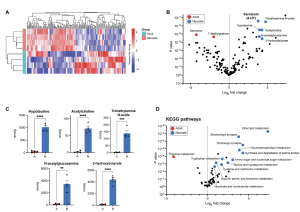A new study sheds light on the surprising role of gut bacteria in protecting newborns from allergies. Researchers discovered that unique bacteria colonize the infant gut shortly after birth, producing a neurotransmitter, serotonin (Figure 1). Serotonin plays a key role in educating the gut’s immune system, preventing allergic reactions to food and the bacteria themselves.

Figure 1: Enrichment of neurotransmitters in the neonatal intestine. (A) heatmap of ~500 metabolites in Si luminal contents of SPF adult and neonatal mice through high- throughput metabolomics analyses. (B) Volcano plot representing fold change of metabolites abundant in Si luminal contents of adult and neonatal mice. (C) con-centrations of specific metabolites from high- throughput metabolomics data in adult and neonatal Sis. (D) Volcano plot representing fold change of Kegg pathways as-sociated with Si luminal metabolites between adult or neonatal mice. all data represent one independent experiment with n= 4 adult mice (a) and n= 4 neonatal mice (n). Statistical tests performed: unpaired t test in (c). **P< 0.01, ***P< 0.001, ****P< 0.0001. adult mice age > 8 weeks, neonatal mice age = P14. See also table S2.
The study revealed that these special newborn gut bacteria are a powerhouse of serotonin production. This serotonin helps develop immune cells called Tregs, which act like the immune system’s peacekeepers, suppressing inappropriate immune responses. Tregs help prevent not only autoimmune diseases but also dangerous allergic reactions to harmless foods or even beneficial gut microbes.
Our gut produces over 90% of the body’s neurotransmitters, including serotonin. While serotonin is usually associated with brain function, receptors for these neurotransmitters are present throughout the body. Interestingly, the study found that the newborn mouse gut has significantly higher levels of neurotransmitters like serotonin compared to adult guts.
The researchers propose that before the developing gut matures enough to produce its own neurotransmitters, these unique bacteria act as temporary suppliers, ensuring a critical supply for early growth. The high serotonin levels promote the development of Tregs, shaping the immune system’s response and preventing it from overreacting to food or the bacteria themselves.
Understanding how the immune system learns and matures during infancy is crucial, but this area remains understudied. This research highlights the important role of gut bacteria in this process.
Journal article: Sanidad, K. Z., et al. 2024. Gut bacteria–derived serotonin promotes immune tolerance in early life. Science Immunology.
Summary by Stefan Botha










